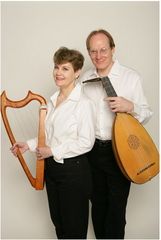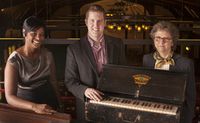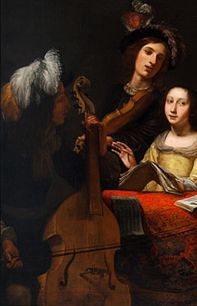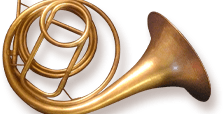 Duport was fortunate enough to have a piece of music dedicated to him by Viotti and a sonata written for him by Beethoven. John Moran and Dongsok Shin perform these pieces on cello and period fortepiano.
Duport was fortunate enough to have a piece of music dedicated to him by Viotti and a sonata written for him by Beethoven. John Moran and Dongsok Shin perform these pieces on cello and period fortepiano.
More information on the performers
 Thursday, October 24 at 1:15 pm
Thursday, October 24 at 1:15 pm
The Chapel at St. Bartholomew's
FREE!
 Ruth Cunningham, voice, baroque flute, and recorder
Ruth Cunningham, voice, baroque flute, and recorder
Marcia Young, voice and harp
Andy Rutherford, English theorbo
This program features luscious soprano duets, arias, and instrumental interludes from the 17th-century from the theatrical works of Henry Purcell and John Blow.
More information on Duo Marchand
Thursday, October 17, 1:15 pm
The Chapel at St. Bartholomew's
FREE!
 Marti Newland, soprano
Marti Newland, soprano
George Spitzer, baritone
Artis Wodehouse, 1827 Broadwood square piano*
Songs and short piano pieces from the United States antebellum time, before the Civil War. Selections will be presented in two 15-minute segments, one devoted to Creole music from New Orleans, and the other to music of Stephen Foster. Each of the two segments are constructed as a flowing sequence of duo and solo songs, with brief period salon piano pieces mingling strategically among them.
*From Tulane University's Special Collections, New Orleans Music
Thursday, October 10, 1:15 pm
The Chapel at St. Bartholomew's
FREE!
Amanda Keil, mezzo-soprano
Brooke Bryant, soprano
Aryeh Nussbaum Cohen, countertenor
Jonathan Woody, bass-baritone
Grant Herreid, tenor & lute
Musica Nuova present a selection of original pastiche of surprisingly dirty songs and catches from English Renaissance and Restoration composers. The Times called this staged sketch-comedy show “fast-paced” and “delightful.”
More on Musica Nuova
Thursday, June 12 at 1:15 pm
The Chapel at St. Bartholomew's
FREE!
Brett Umlauf, soprano
Daniel Swenberg, Baroque guitar & Baroque lute
Leah Nelson, Baroque violin
Anneke Schaul-Yoder, Baroque cello
This program explorse late Rococo music from France and Sweden. The Greek and Nordic goddesses of Love and the god of wine were at the center of Carl Bellman’s sublime and subversive poetry and his cult of Bacchus.
Thursday, June 5 at 1:15 pm
The Chapel at St. Bartholomew's
FREE!
Edmond Chan, baroque violin
Amy Domingues, viola da gamba
Anthony Harvey, theorbo
Corda Nova’s program explores the vast musical riches of the court of the Sun King, Louis XIV. Under his patronage, composers such as Leclair, Lully, and Marais created a quintessentially French musical idiom which influenced composers across Europe in the century to follow.
Thursday, May 29 at 1:15 pm
The Chapel at St. Bartholomew's
FREE!
Judson Griffin, violin
Margaret Ziemnicka, violin
ChiuChen Liu, viola
David Bakamjian, cello
Thursday, May 22 at 1:15 pm
The Chapel at St. Bartholomew's
FREE!
Elena Zamolodchikova, harpsichord
A program featuring keyboard works by J. S. Bach. Elena Zamolodchikova, a native of Moscow, Russia, finished Moscow Tchaikovsky Conservatory's Historical and Contemporary Performance Department and Juilliard School's newly opened Historical Performance Department, holding degrees in harpsichord and other historical keyboard instruments performance.
Thursday, May 8 at 1:15 pm
The Chapel at St. Bartholomew's
FREE!
aura Heimes, soprano
Deborah Fox, lute and theorbo
Soprano Laura Heimes and lutenist Deborah Fox explore the varied world of 17th century song accompanied by lute and theorbo. Exquisite texts blend with beguiling melody in English songs by Dowland, Lanier, Lawes, and Purcell, while passion meets virtuosity in Italian songs by Strozzi, and Monteverdi.
Thursday, May 1 at 1:15 pm
The Chapel at St. Bartholomew's
FREE!
Vita Wallace, baroque violin
Beverly Au, pardessus de viole
Lisa Terry, basse de viole
Deborah Fox, theorbe
This quintessentially French program features rare French lyra-viol dances by du Buisson and de Machy, music for the elegant but equally rare pardessus de viole so popular in 18th centuray France, a trio sonata by celebrated violinist/composer/child prodigy Elisabeth Jacquet de la Guerre, and the iconic theorbo music of de Visee.
Thursday, April 24 at 1:15 pm
The Chapel at St. Bartholomew's
FREE!
Holy Week Special! Same time, different location.
April 17 at Immanuel Lutheran Church
122 East 88th Street at Lexington Avenue, Manhattan
ARTEK
Johann Rosenmüller: Lamentationes Jeremiae Prophetae.
Sarah Chalfy, soprano and Gwendolyn Toth, organ
The great 17th-century German composer, Rosenmüller, wrote Lamentations of Jeremiah for Tenebrae for Holy Week; several of the Lamentations have survived and will be performed on this concert by soprano Sarah Chalfy, who has been widely acclaimed for her performances of music ranging from the early baroque and classical periods to contemporary music, cabaret and Broadway, accompanied by ARTEK director Gwendolyn Toth.
Dorian Komanoff Bandy, violin
Rachel Evans, viola
Christine Gummere, cello
Beethoven wrote this trio while still in his twenties, before his world was silenced. It is the work of a mature composer minus the rage and darkness of later years. For string players, performing early Beethoven is like drinking expensive champagn - very high class, sparkling with lyricism and laughter.
Thursday, April 10 at 1:15 pm
The Chapel at St. Bartholomew's
FREE!
Adriane Post, violin
Johanna Novom, violin
Kyle Miller, viola
Paul Dwyer, cello
This program presents two quartets that illustrate a connection between Mozart and Haydn’s work. Haydn Op. 20, written in 1772, has long been considered to be a possible influence of Mozart’s evolution of style towards more serious quartet composition, beginning around the year 1773. The serious Mozart Adagio and Fugue, although written in 1788, has an identical fugue as a piece for two pianos written in 1773.
Thursday, April 3 at 1:15 pm
The Chapel at St. Bartholomew's
FREE!
Deborah Booth, recorder and traverso
Stephen Rapp, harpsichord
Maxine Neuman, baroque cello
A concert sampler exploring the evolution of ornamentation across changing musical fashion in Italy from 1630 to 1730, contrasting works byDario Castello, and Girolama Frescobaldi, withSonatas of Francesco Barsanti, FrancescoMancini, and Pietro Locatelli. BREVE’s duo of Deborah Booth and Stephen Rapp adds returninglongtime ensemble member Maxine Neuman foran exciting trio concert.
Thursday, March 27 at 1:15 pm
The Chapel at St. Bartholomew's
FREE!
Amy Bartram, soprano
Ekko Jennings, lute
Songs by the 17th-century English composers and brothers Henry and William Lawes, plus lute instrumentals from the period.
Thursday, March 20 at 1:15 pm
The Chapel at St. Bartholomew's
FREE!
Theresa Salomon, violin
Gwendolyn Toth, harpsichord
Virtuoso violin sonatas by Giusepped Tartini (1692-1770) and Arcangelo Corelli (1653-1713). Theresa Salomon will be accompanied by ARTEK director Gwendolyn Toth on harpsichord.
Thursday, March 13 at 1:15 pm
The Chapel at St. Bartholomew's
FREE!
Sarah Paysnick flute
Kristin Olson, oboe
Thomas Carroll, clarinet
Yoni Kahn, horn
Elizabeth Hardy bassoon
Anton Reicha was an early innovator in writing for the wind quintet, and his position as composition professor at the Paris Conservatory gave him access to the best wind musicians in Paris. His quintet in Eb offers abundant displays of both instrumental virtuosity and Reicha’s skill at counterpoint.
Thursday, March 6 at 1:15 pm
The Chapel at St. Bartholomew's
FREE!
Karen Marie Marmer, violin
Dongsok Shin, fortepiano
The program features the works of three composers who worked around the same time, and whose ties to Paris helped acquaint them to each other. The 18th-century Alsatian composer, Jean-Fredéric Edelmann whose fate was met by the guillotine, was admiredéderic Edelmann, whose fate as met by the guillotine, was admired by Mozart although his music fell into obscurity; when the much-admired J.C. Bach died in 1781, Mozart proclaimed “it’s a sad day for the world of music,” however his work soon faded from public notice. The works on the program were published in 1779, 1780, and 1781, respectively. The sonata by Edelmann most likely will enjoy its North American premiere.
Thursday, February 27 at 1:15 pm
The Chapel at St. Bartholomew's
FREE!
Brittany Palmer, soprano
Brett Umlauf, soprano
Antonia Nelson, Baroque violin
Liv Heym, Baroque violin
Anneke SchaulYoder, Baroque cello
Kelly Savage, harpsichord
In this exciting program, SIREN Baroque highlights both known and little-known women composers from the French court of Versailles to the convents of Italy. This program is the second part of SIREN Baroque’s Women Composers series and offers a diverse and wide range of styles, which illustrates how women contributed to the formation of the baroque era.
Thursday, February 20 at 1:15 pm
The Chapel at St. Bartholomew's
FREE!
 Judson Griffin, baroque violin
Judson Griffin, baroque violin
Margaret Ziemnicka, baroque violin
Lawrence Lipnik, viola da gamba
Patricia Ann Neely, viola da gamba
Carlene Stober, viola da gamba
Rick Erickson, chamber organ, harpsichord
Instrumental works of German composers who thrived despite unrest during the 30 Years' War by traveling to European cultural centers.
Thursday, February 13 at 1:15 pm
The Chapel at St. Bartholomew's
FREE!
Note: Concert was cancelled because of a storm.
The struggle between Sacred and Profane Love played itself out in the churches, salons, and theaters of the Renaissance and Baroque. We bring this argument to life in selections by Bononcini centering on Mary Magdalene, the symbol par excellence of humankind’s battle to be good in spite of so many compelling reasons to be bad!
Thursday, February 6 at 1:15 pm
The Chapel at St. Bartholomew's
FREE!



